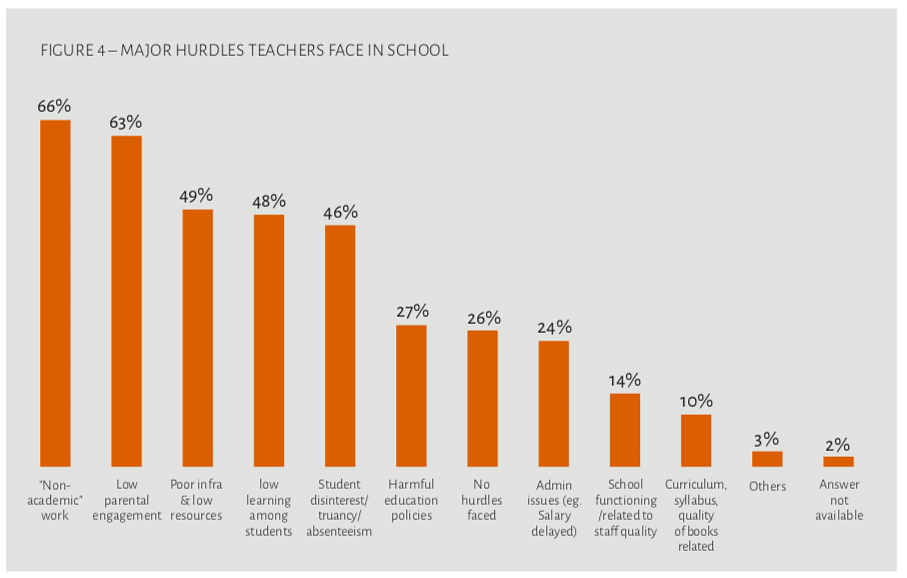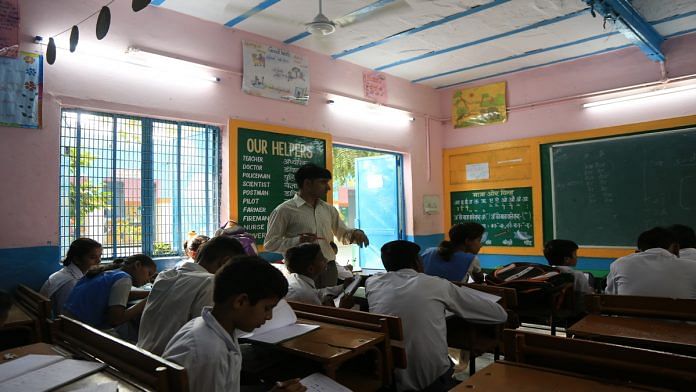I feel helpless and guilty for not being able to give full time to my students… makes me think what am I getting this salary for?”
“I feel like a clerk most of the time!”
These statements embody two powerful narratives that we have repeatedly heard in government schools across different states in India. The narratives are of teachers feeling overworked and overburdened, and of teachers expressing concerns about spending a lot of time on activities other than teaching, which cut into teaching time and affect their self-identity as teachers.
If teachers’ narratives about working in Delhi’s government schools hold true, it would in fact amount to violation of children’s legal right to acquire a good quality education as stipulated under the Right of Children to Free and Compulsory Education Act, 2009 (RTE).
A report released by the National Institute of Educational Planning and Administration (NIEPA) stated that only 19.1 per cent of a teacher’s annual school hours were being spent on teaching related activities, while 42.6 per cent time went in “non-teaching core activities” and 38.3 per cent time went in school management and other education department related activities. The study covered government school teachers from Maharashtra, Karnataka, Gujarat and Odisha.
Delhi’s DoE/MCD schools
This study by Accountability Initiative focused on teachers who had to juggle multiple tasks, to see to what extent teachers were able to manage teaching along with other activities and understand the range of issues surrounding such multitasking.
The final school sample consisted of 39 schools with 12 Directorate of Education (DoE) i.e. state government administered schools, 3 DoE Aided, and 24 Municipal Corporation of Delhi (MCD) schools. The median student enrolment was 687 in the sampled DoE schools, 384 in the MCD schools and 244 in the three sampled DoE Aided schools.
Also read: To be happy, be an adult: The new lesson for children in Delhi schools
Understanding of their roles as teachers
Of all the activities that teachers do, a majority of the respondents felt that the following were their “primary” responsibilities as teachers: Preparing lesson plans and designing activities for student learning; invigilation/exam duties; attending trainings and workshops.
Some teachers felt it was impractical to prepare and follow detailed lesson plans or to use activity-based methods to teach, due to time, infrastructure and other constraints.
Similarly, teachers had mixed reactions to the idea of attending workshops and seminars. Many teachers responded that while they recognised trainings were essential for professional development, they wished for trainings that were of higher quality, less theoretical and addressed their school specific issues.
‘Non-academic’ duties in school
Teachers made a distinction between two types of recordkeeping work, preferring to work on one type of record over the other.
The first type involved maintaining basic information that is directly related to the students they were teaching, which includes student attendance, test scores and enrolment data. While 37 per cent and 32 per cent respondents said this should be a primary task and secondary task, respectively, 31 per cent of teachers felt they should not be doing this at all.
The second type was more clearly described as “administrative”, “non-academic” and/or “clerical” work. This involved records that teachers recognised as essential to school management, but were not directly related to teaching-learning processes or outcomes. For instance, opening bank accounts, updating students’ Aadhaar IDs, distributing and maintaining records of entitlements like uniforms, scholarships, books etc., responding to department circulars and feeding UDISE (Unified District Information System for Education) information, were viewed as “administrative” and/or “clerical” tasks by the respondents. These activities were further described as time-consuming as they had multiple steps – from collecting the information to organising the data to verification to online data entry – all of which cut into teaching time.
Teachers stated that they had no choice but to do these activities in the current schema because of the students’ backgrounds. Many parents could not be relied upon to fill forms accurately. Vacancies and/or low competence of clerical staff in DoE schools and lack of such posts in MCD schools exacerbated the problem.
Also read: Teachers can’t be asked to perform non-educational duties outside RTE Act, rules Delhi HC
While overall trends in responses on “non-academic” duties were similar for MCD and DoE teachers, two main differences were noted. First, with respect to the task of distribution, 29 per cent of MCD teachers felt this was a primary task for them while 7 per cent of the DoE teachers felt the same way. This is not surprising since MCD schools cater to primary school students who are of a very young age.
Second, the percentage share of school management duties which were viewed as “primary” was slightly higher for MCD teachers who were most likely influenced by the fact that their schools do not have clerical staff.
Through this combination of responses, it emerged that tasks which were not directly related to teaching-learning appeared to clash with teachers’ fundamental perception of who a teacher was or should be. As one teacher succinctly pointed out: “Our job is to teach, not to do the work of lower division clerks…”
Everyday experiences in school
Teachers were also asked about the major hurdles they faced while working in their school. The top 5 issues identified by both MCD and DoE teachers were the same.

There was a sense of exasperation with which most teachers spoke about teaching their students. Many of the respondents expressed their disappointment and frustration with students and their family background.
Difficulties in planning and time-management
Teaching and other academic activities:
Time spent on teaching constituted 41 per cent and 39 per cent of the overall time spent by teachers in MCD and DoE schools, respectively, across the three phases. When this includes “academic” activities such as classroom management, games and sports, and teaching-learning supporting activities, the overall percentage of time goes up to 49 per cent and 52 per cent in MCD and DoE schools, respectively. It is, however, important to highlight that many of the sampled teachers could not spend even half their time in school, teaching.
Regular interruptions, usually related to routine “school management” tasks, cut into teaching time in both types of schools.
A closer look at the timesheet of 35 DoE teachers and 54 teachers from the MCD sample shows that even though total time spent on certain non-teaching tasks was not significantly high, its intermittent distribution throughout the day could be a reason for teachers’ perception of feeling bogged down by “non-academic” tasks.
In MCD schools, the issue of teachers having to split time between teaching and “school management” activities is compounded by the fact that teachers are not assigned any scheduled “free periods” to tend to essential non-teaching tasks. Instances of guardians disrupting classes to resolve administrative queries around admissions, bank accounts or school leaving certificates, among other issues, were also noted in MCD teachers’ timesheets.
School management:
Despite assigning specific “additional charges” to teachers, work was often delegated and/or distributed among several teachers, especially when data from multiple classes had to be collected and prepared. In other words, multiple teachers might be affected by a “school management” task, and not just the teacher who has been officially charged with the responsibility of a task. Thus, timesheets of many of the teachers reflected activities which were not under their official charge.
Routine “school management” tasks such as noting and submitting students’ and teachers’ attendance, timetable adjustments, organising and participating in the school assembly, managing students outside classrooms, overseeing dispersal of students, and supervising MDM distribution, frequently took up more time than needed. This was largely due to procedural inefficiencies, limited capacities and resource constraints. In MCD schools, daily tasks including attendance, MDM (mid-day meal) and overseeing student dispersal took up more time than needed due to a combination of staff shortage and technical difficulties such as malfunctioning biometric machines and poor to no internet connectivity.
A similar trend was observed in DoE schools, although the nature of time-consuming routine work, differed slightly. Most disruptions to teaching generally occurred in the first half of the day, particularly in the first period, primarily due to start-of-day classroom management and everyday tasks such as taking and uploading attendance, arranging the timetable for the day, settling down the class, going through circulars, responding to letters and so on.
Also read: Teachers’ Day: Professors who teach to question are the first ones to go
Working beyond school hours:
Teachers were found to be working beyond school hours, fairly regularly, especially in MCD schools, where teachers are expected to stay back till guardians collect their wards from the school. However, overall time spent working beyond school hours was not as high on the days the time use data was reported by teachers, when compared to how teachers appeared to portray it in the perception survey.
Of the total 39 hours reportedly spent by DoE teachers working beyond school hours, 49 per cent was spent on tasks that were “academic” in nature, while 51 per cent was spent on tasks related to “school management” activities such as, marking their attendance, managing student dispersal and record-keeping work like making exam result summaries, external exam invigilation duties, and responding to official mails and circulars.
In MCD schools, teachers spent a total of 49 hours working beyond school hours, of which a mere 6 per cent was spent on “academic” activities like checking copies, unit test answer scripts and lesson planning, while 94 per cent was spent on “school management” and “other” activities. MCD teachers spent significantly more time on management activities such as recording facial attendance of students, waiting with students whose guardians were late to collect them, addressing guardians’ inquiries regarding admissions and withdrawal, as well as collecting documents, signatures and filling out various forms for parents including bank, and Aadhaar forms.
Recommendations and way forward
To maximise the time available to school actors, the following recommendations could be considered by education planners:
1. Preparing people to take on the role of a government school teacher and managing expectations.
2. Improving planning, managing workflows, and setting school priorities straight.
3. Reducing time spent on record-keeping related tasks such as recording information, analysing, retrieving and managing school related data.
4. Improve staffing and infrastructure in MCD schools.
The author is a Senior Research Associate at the Accountability Initiative (AI), Centre for Policy Research (CPR), New Delhi.
The article is an edited excerpt from ‘Report on Time Allocation and Work Perceptions of Teachers‘. The full report can be accessed here.




Very True, I must congratulate the writer for stating the facts in such cohesive manner.Most schools do under staffing and most of the non-teaching stuff falls on the teacher, at this point the standard of teaching , imparted knowledge , skills are completely out of question. The management believes in Jargon,and only concerned with the revenue and at the same time the only objective that becomes primary is to appease the affluent parents who have huge money to spend on their children but have no time for them. They expect their children to come out as scholars not as an educated person. The irony is that the good days aren’t near as we are trying to imitate other countries in pursuing our own education system. The education systems suggests that we are simply creating CEOs and not great thinkers, we value credibility by the the marks scored and the pay cheque. SO in these circumstances where everything has turned materialistic so an abstract thing like good teaching never stands a question.
What about election duty and survey etc.